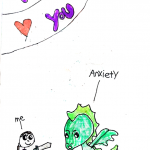The Amazing Adolescent Brain

Those of us who are lucky enough to know a teen are often amazed by the way their minds work. We have probably seen how passionate they can be about a cause they are interested in, or how brave they can be about making connections with peers they’ve never met before.
I think we also know they sometimes get a bad rap. Sometimes teens are seen as being dangerous risk takers. Often parents feel frustrated by their “attitude” and the perception that they care more about their friends’ opinions than their parents.
I recently stumbled upon a podcast episode called “Understanding the teenage brain with Eva Telzer, PhD” from the Speaking of Psychology Podcast by the American Psychological Association. Eva was discussing some of the new findings in neuroscience related to the adolescent brain. It was a wonderful listen and caused me to do a bit of further research. If you are interested “What neuroscience tells us about the teenage brain” by Zara Abrams, published by American Psychological Association is a great follow-up read.
There were a couple of highlights from this new research that really stuck out to me, and I thought might be of interest to anyone who knows or works with a teen.
1. It’s not true that teens are completely at the mercy of peer pressure.
“… looking at their risk attitudes and their prosocial attitudes. We find that teens go along with their parents’ attitudes and their peers attitudes at about a 50-50 level. So they're just as likely to follow what their parents attitudes are as they are to follow what their peers attitudes are. And what's actually quite striking is that they stick with their own attitudes more often than they go along with what their parents or their peers think. And so rather than being like overly susceptible to what other people think in their social environment, especially their peers, adolescents are actually kind of sticking to their guns more often than they are to follow what their peers think or even what their parents think. And we think that this is quite remarkable compared to the overall stereotype that teens are overly susceptible to others. And actually teens kind of are independent thinkers and stick with what they think are positive and negative behaviors, more so than they are to go along with others.” (Eva Telzer, Speaking of Psychology podcast episode 203).
I think some of the negative stereotypes about teens can sometimes make parents feel helpless in parenting their teen, but this new research helps us to understand that parents continue to be extremely important to teens. We can also see how all that hard work parents did in the early years can now help teens to have a defined set of values that they stick with when faced with a decision.
2. Risk taking isn’t inherently bad.
“There's lots of different ways that risk-taking can be adaptive. One is that just from an evolutionary perspective, going out, learning from your environment, engaging in kind of flexible behaviors, trial and error helps adolescents to learn and develop and explore who they are and what matters to them. It allows them to make new friends, to get away from the family and find a mate. So, sort of from that kind of evolutionary perspective, it promotes development. There's also adaptive ways that it can happen just in terms of these more positive risks that I alluded to earlier. Raising your hand in class or asking your crush out on a date, or trying out for a challenging sports activity or something else that might be challenging that you might be scared to do but taking the risk to try it, are all ways that risks can be highly adaptive in adolescents.” (Eva Telzer, Speaking of Psychology podcast episode 203).
Once we have an understanding of risk-taking as a behaviour that can be good, bad, or somewhere in between, we can begin to see examples all around us of teens taking positive risks. For example we see teens sticking up for peers. We see them leaving home for the first time in their life to go and live in a university dorm where they don’t know anyone, and coming home by Christmas with all sorts of new friends and connections. We often see teens engaging in positive social justice movements. This perspective can help parents feel less anxious and more open as the teenage years approach. Paired with a great connection, parents can be there to guide and support their teens to use those risk taking behaviours in a positive way.
3. Teens aren’t just a less developed version of adults. This stage of development is adaptive.
“Adolescents actually are very good at regulating their behavior. They have not a broken brain or undeveloped prefrontal cortex, but a regulatory system that's very flexible and can be engaged to meet their motivational goals. And so it's not that they can't regulate their behavior. It's just that sometimes their goal is not to regulate their behavior because the reward of one behavior just may be much more highly valued than the reward of regulating that behavior. And so they choose to engage in it. It's not that they are incapable of not stopping themselves from engaging in it.” (Telzer, Speaking of Psychology podcast episode 203).
This is another shift in our perspective around teens. Understanding that teens might be acting in a certain way because of things they care strongly about and not just because of less developed brains can be helpful. Even when teens choose a behaviour that is problematic for parents we can connect and find out more about what they were thinking and feeling when they acted because at the heart of the matter, it was probably something connected to a value or something they care about. As parents we are in a better place to guide and support our teens towards more positive choices in the future when we understand what motivated them to take the action.
I hope you enjoyed these tidbits about the teen brain as much as I did!


